- Faculty News
- Student News
- Lab News
- Publications
- Meetings and Presentations
- Outreach
- Grants
- Announcements
- About This Newsletter
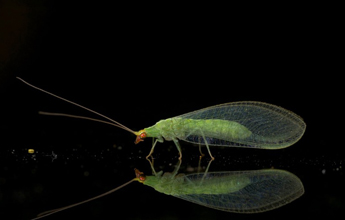
ABOVE: A green lacewing captured by Dr. Thomas Chouvenc.
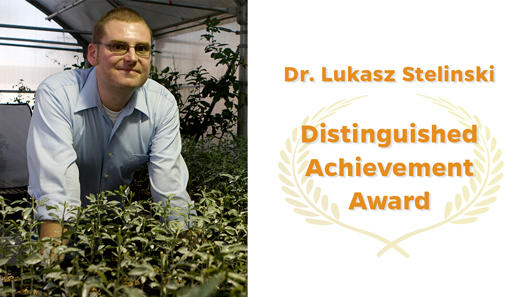
ABOVE: Dr. Lukasz Stelinski, professor at the Citrus Research and Education Center, has been awarded the 2021 SEB Distinguished Achievement Award in Horticultural Entomology. The award recognizes outstanding contributions to American horticulture that increases the quality and value of plants, improves the productivity and profitability of the nursery and landscape industries, and protects and enhances the environment. Congratulations Lukasz! UF/IFAS photo by Tyler Jones.

The 2021 termite dispersal flight season kicked-off in south Florida with an interview with the annual termite situation report delivered by Dr. Thomas Chouvenc. His interview with the local NPR news station (WLRN) can be heard HERE beginning at timestamp: 33:16.

On February 25th “Manatees May Carry Half a Million Microscopic Hitchhikers”, featuring research from Dr. Gilbin-Davis colleagues from the Florida Medical Entomology Laboratory, was published by the New York Times. Read about the original publication here.

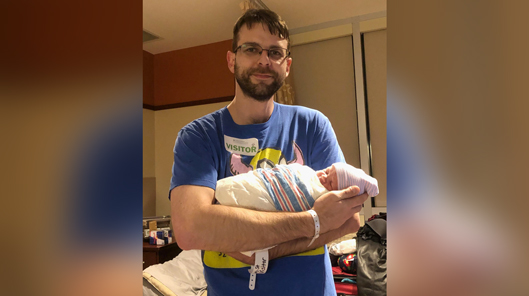
ABOVE: Nematode Assay Lab technician Laban Goolsby and Stephanie are proud parents. Kade was born February 8th - weighing 6 pounds, 7 ounces, and 20 inches. Congratulations Laban!

Black in Ento Week!
February 22nd to the 26th was Black in Entomology Week, a broad campaign which used the power of social media to showcase the work of Black entomologists across the US and globally. The week was marked by a series of virtual events, exploring everything from entomophagy and entomological art through to career panels for undergraduates and grad students and discussions of colonialism in entomology.
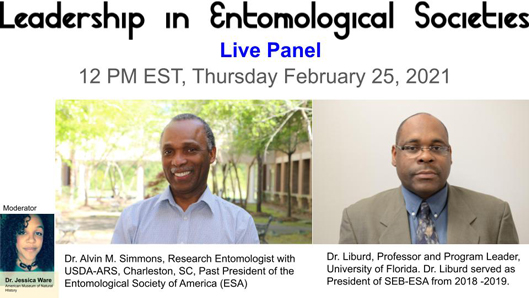
ABOVE: Dr. Oscar Liburd was an invited panelist in the Black Leadership in Entomological Societies session as the 2018-19 President of SEB-ESA. If you're interested in these topics, many of the sessions are available on the organizer’s YouTube channel.
The organizers of BlackInEnto raised money for research awards for Black scholars at the undergraduate and graduate level. Visit their website for more information and to apply.
During BlackInEnto campaign, our department wanted to celebrate and amplify the work of our Black faculty and students. If you haven't yet had the chance, visit their profiles and find out more about their research and achievements here.
The Lucky Lab won Best Paper Award 2020 by the Myrmecology News Blog for their paper titled “Myrmecology, Gender, and Geography: changing demographics of a research community over thirty years". Co-authors on this paper all worked in or with the Lucky Lab: postdoc Yuanmeng Miles Zhang is a bioinformatician and systematist specializing on gall wasps who now works at the Smithsonian Institution; Ph.D. student Leo Ohyama studies ant ecology and biodiversity; Ph.D. student Jason Williams is overhauling the systematics of the ant genus Nylanderia; Ph.D. student Cat Lippi is a medical geographer studying insect-borne disease transmission; graduated M.S. student Rachel Atchison focused on ant diversity in threatened habitats and now works at the USDA; undergraduate Keara Clancy has now started a M.S. degree in Wildlife; undergraduate Lexie Nielsen recently graduated with a degree in Environmental Science; undergraduate James Pinkney is now a UF M.S. student in Entomology.

Dr. Rebecca Baldwin, Dr. Keith Willmott, Sara Zlotnik, Gabriel Somarriba, and James Brown were recognized for their contributions in mentoring first generation, limited income and underrepresented students at the iDigTRIO Biological Career Conference and Fair held February 11th to the 13th. The theme of the 2021 conference was “There’s no formula for being a scientist.” Participants had the opportunity to shadow and interview scientists where they were encouraged to explore pathways to careers in the biological sciences. iDigTRIO is organized by iDigBio, TRIO Student Support Services and the UF Office of Academic Support. Find out more here.

The Miller Lab has launched a part-time internship in Biological Research and Science Communication! We are excited to hire two recent graduates, Genhsy Morzon and Elizabeth Haney, as interns supporting our experimental evolution project. They are also working closely with live insects (Hemiptera: Coreidae) to develop the first artificial diet for this species, mastering digital measurement with ImageJ, and gaining skills for communicating science to diverse audiences in an exciting and purposeful manner.
Need to name that bug? A host of experts are available to help Floridians identify any insect or related arthropod. If a mystery creature has six or more legs, the UF Insect ID Lab is the place to call.
Pipevine swallowtail larvae sequester aristolochic acids from their hostplants, which makes the larvae and subsequent adults toxic or distasteful to various potential predators and parasitoids. Several other butterfly species bear a close resemblance to the pipevine swallowtail, and this mimicry gives them some protection from predators. Andrei Sourakov made the below display of the pipevine swallowtail and its mimics.
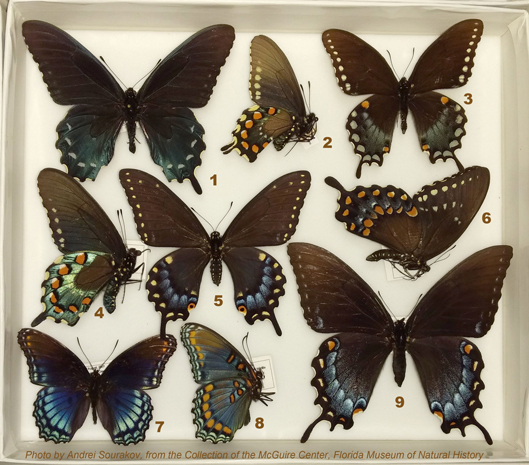
ABOVE: The toxic pipevine swallowtail and its various mimics. Test your ID skills by matching up the numbered butterflies with their names! See the answer key at the end of the newsletter.
If you need insect images for a publication or presentation for your UF/IFAS Extension or teaching work, you can go to this direct link, pictures are copyrighted material and intended for official UF use only. Log onto the website using your Gatorlink credentials.
Lyle Buss is the UF/IFAS Insect ID Lab manager.

Think it might be a nematode problem? The Nematode Assay Laboratory serves Florida and other states by providing nematode assays and expert advice regarding nematode management.
For more information on the Nematode Assay Laboratory, please contact the lab manager Dr. Billy Crow.
Baniya A, DiGennaro, P. 2021. Genome announcement of Steinernema khuongi and its associated symbiont from Florida. G3 Genes | Genomes | Genetics.
Blumenfeld AJ, Eyer PA, Husseneder C, Mo J, Johnson LN, Wang C, Grace JK, Chouvenc T, Wang S, Vargo EL. 2021. Bridgehead effect and multiple introductions shape the global invasion history of a termite. Communications biology 4: 1-12.
Campbell LP, Burkett-Cadena ND, Miqueli E, Unlu I, Sloyer K, Medina J, Vasquez C, Petrie W, Reeves LE. 2021. Potential distribution of Aedes (Ochlerotatus) scapularis (Diptera: Culicidae): A vector mosquito new to the Florida Peninsula. Insects 12: 213.
Chen, XD, Neupane S, Gossett H, Ebert TA, Gossett H, Pelz-Stelinski KS, Stelinski LL. 2021. Insecticide rotation scheme restores insecticide susceptibility in thiamethoxam-resistant field populations of Asian citrus psyllid, Diaphorina citri Kuwayama (Hemiptera: Leviidae) in Florida. Pest Management Science 77: 464-473.
Dareus R, Porto ACM, Bogale M, DiGennaro P, Chase CA, Rios EF. 2021. Resistance to Meloidogyne enterolobii and Meloidogyne incognita in Cultivated and Wild Cowpea. HortScience 1: 1-9.
George J, Lapointe SL, Markle LT, Patt JM, Allan SA, Setamou M, Rivera MJ, Qureshi JA, Stelinski LL. 2020. A multimodal attract-and-kill device for Asian citrus psyllid Diaphorina citri (Hemiptera: Liviidae). Insects 11:870. https://doi.org/10.3390/insects11120870
Lucky A, Atchison RA, Ohyama L, Zhang YM, WilliaM.S. JL, Pinkney J, Clancy KL, Nielsen AN, Lippi CA. 2020. Myrmecology, Gender, and Geography: changing demographics of a research community over thirty years. Myrmecological News 30: 187-199.
Velenovsky JF, Gile GH, Su NY, Chouvenc T. 2021. Dynamic protozoan abundance of Coptotermes kings and queens during the transition from biparental to alloparental care. Insectes Sociaux 68: 33-40.

New on Featured Creatures:
Northern house mosquito, Culex pipiens Linnaeus, 1758 (Insecta: Diptera: Culicidae) written by Abdullah A. Alomar, Nathan D. Burkett-Cadena, Derrick K. Mathias.
Black dwarf honey bee, Apis andreniformis Smith (Insecta: Hymenoptera: Apidae) written by Mary Nordgulen, Brynn Johnson, and Cameron Jack.
Tomato bug, tobacco leaf bug, Nesidiocoris tenuis Reuter (Insecta: Hemiptera: Miridae) written by Victoria Oluwaseun Adeleye and Dakshina R. Seal.
Do you have a favorite creature? Learn how to make it into a Featured Creatures!
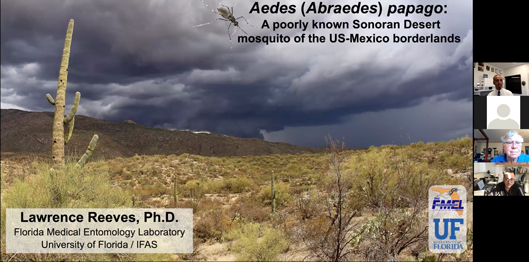
Dr. Lawrence Reeves presented "Aedes (Abraedes) papago: A poorly known Sonoran Desert mosquito of the US-Mexico borderlands" at the 2021 American Mosquito Control Association Virtual Conference, and this presentation was voted Best Talk of the 2021 Mosquito Lightning Symposium.
Dr. Lawrence Reeves presented "Insights into mosquito diversity and ecology through DNA barcoding" at the 2021 American Mosquito Control Association Virtual Conference.
Dr. Lawrence Reeves and Dr. Dongmin Kim presented "The effects of size and circadian activity patterns of nontarget pollinators on susceptibility to mosquito adulticides" at the 2021 American Mosquito Control Association Virtual Conference.

Dr. Billy Crow presented “Lance and Root-Knot Nematodes on Bermudagrass” at the Florida Turfgrass Association Seminar in Plant City February on 24th.

Dr. Thomas Chouvenc provided a virtual workshop sessions on termite biology and termite control to the a pest control audience in collaboration with the West Palm Beach Extension office on February 23rd 2021, and to the Broward Master Gardner Association in collaboration with the Broward extension office on March 3rd.

Dr. Ginny Greenway, a postdoc in the Miller Lab, gave two invited virtual seminar presentations in February. The first of these was at the University of Cambridge on the topic of individual investment in insect weapons, and a second at the University of Bangor on components of variation in reproductive success as part of their Life and Environment seminar series.

Kristin Dunn, a Ph.D. Candidate in the Branham Lab, was invited to speak at the UF Research Service Centers webinar Nano-CT Research Going on at UF: Bats, Frogs, Fossils, Oh My! on March 4th. Her presentation was titled "Investigating the evolution of firefly light organs with micro-CT."
From the outreach coordinator
Don’t forget the Entomology and Nematology Education and Outreach Program is available and will accommodate to both virtual presentations and approved in person presentations too!
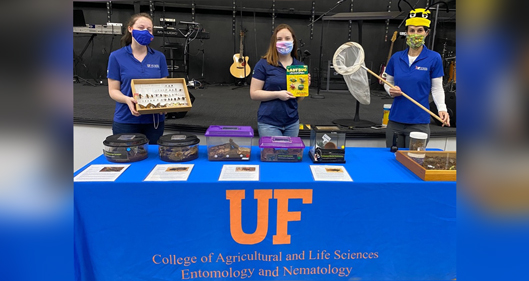
ABOVE: Outreach was so happy to have an in-person event and present to a group of homeschoolers in Valdosta, Georgia on February 1st. Pictured are Laurel Lietzenmayer, Jordyn Ranfone, and Jennifer Standley.
Past Outreach events:Future Outreach events:February 1 – At Home Learning Community (Valdosta, Georgia), Laurel Lietzenmayer, Jordyn Ranfone, and Jennifer Standley made a road trip to Georgia for an in-person presentation to a group of home schoolers and their families. We were so excited to get out that we were willing to make the extra-long drive.
March Outreach Events:
Alachua County Schools will be having virtual presentation throughout the month. Email the Outreach Coordinator, Jennifer Standley, if you would like to find out more and volunteer.

What’s better than a live show and tell of some really cool arthropods?! Our live petting zoo consists of tarantulas, scorpions, vinegaroons, bess beetles, Madagascar hissing cockroaches, and native insects when in season. With a short training program, they are available for you to check out should you be leading an outreach event, even if it is virtual. The critters are always popular with both youth and adults and are used as a tool to expose the public to STEM disciplines. We have doubles of our most popular critters, as well as various native insect species depending on the time of year. We have large wood and Plexiglas cages for viewing our native orb weaving spiders. There is one travel cage and one larger static cage. We also have activity kits and lesson plans that are available as well. Please be sure to contact us and review the protocol on transportation and handling of the animals. If you lead an outreach event, be sure to fill out a documentation form so your event can be included in the newsletter and we can log all outreach events. Also note, that volunteering to assist with outreach events will count as departmental service for ENSO travel grants. (Please note that some venues require background checks or additional screening.) If you have any questions or would like to volunteer, please email us.
Getting social!
Use #UFBugs so our department can find and share your social posts easily!
Dr. Bryan Giordano, Dr. Lindsay Campbell, and Dr. Yoosook Lee were awarded an SIPMC grant of $40,000 to establish a multi-state working group focused on invasive mosquito species.
Dr. Martini obtained a $19,923 grant with Southern SARE titled “Development of a Push-Pull System in Avocado Groves in South Florida”
Want grant writing tips? Check out the UF Libraries Grants Management Program
Ph.D. Exit Seminar Reina Tong titled “Nitrogen Conservation in Subterranean Termites” on March 23 at 1:00 - her chair is Dr. Su.
We’re hiring – we are currently looking to fill postdoc and OPS positions, find out more here.
Want to stay up to date? Check out our website home page for a link to our Google calendar.
Suzy Rodriguez is the newsletter editor and does the HTML coding. Newsletters usually are published around mid-month. Submit items for an issue by the seventh of the month.
We like to share news when it happens using our social media outlets: Twitter, Facebook and YouTube. Follow us on these sites for daily updates! When you send news, we will post it on one or more of these sites and again in the monthly newsletter. Please be sure you have permission from people in photographs you submit for publication.
UF-Bugnews-L listserv subscribers receive notices when issues are posted. Our home page has instructions for subscribing and unsubscribing.
Special thanks to James Brown and Nancy Sanders for reviewing the newsletter for errors, and to Jane Medley and Don Wasik for webpage build and design.
Give Back
Want to support the UF Entomology & Nematology Department? Consider making an online gift today! Questions can be directed to Cody Helmer at (352) 392-1975 or chelmer@ufl.edu.
Answer key from Lab News section
1, 2, 4 - Pipevine swallowtail (Battus philenor)
3, 6 - Spicebush swallowtail (Papilio troilus)
5 - Eastern black swallowtail (Papilio polyxenes)
7, 8 - Red-spotted purple (Limenitis arthemis Astyanax)
9 - Eastern tiger swallowtail (Papilio glaucus)